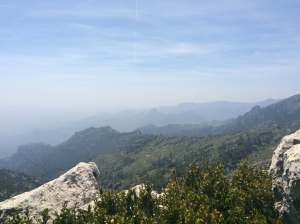Undertaking an international postdoc is the goal for many lucky PhD graduates. In fact, it is often seen as the only way to progress your career.
Meeting researchers from different countries, learning different methods, getting in touch with the international community and applying your Australian experience to a new area (whether that is geographically or varying your field of expertise) is important career stuff. A friend once told me that doing an international postdoc was like doing a PhD all over again, there was so much to take in. Now that I’m here, I completely agree. It’s rewarding, tiring, overwhelming and inspiring all at once.
But what about the non-career related opportunities that an international job placement holds? The chance to learn a new language, experience a different culture, eat new food and travel to exotic locations. These features are often promoted when advertising international postdoc positions, but how do you fit them in while doing well at your hard-earned job?

This thought has been reappearing in my head over the past month, as I have juggled my job along with weekend adventures and several visitors from Australia. Of course I am in a luxurious position, trying to balance my work with fun trips to Barcelona and Madrid. These temporal acrobatics are nothing compared with the choices made by parents juggling academia with motherhood. And I am particularly lucky to have an understanding supervisor, and be in a country that has a relaxed attitude towards working hours.

Although cloning is one good option, my current method of managing work and play is to work extra hours whenever possible. This means I can have some extra time off when visitors are around. I take my phone with me when I am out of the office to respond to any urgent emails, and make sure my supervisor knows if I am going to be away. There is also a crazy amount of ‘leave maths’ in the back pages of my diary, trying to make the most of public holidays and the precious annual leave.
These past few weeks have also got me wondering how much supervisors consider extra-curricular activities when they hire an academic from overseas. Do they factor in a 5% loss of productivity for the first six months or so, to incorporate time spent learning a new language and exploring a new place? Should extra opportunities be provided to visit other nearby research centres, or attend local courses, thereby combining work with exploration? Or does the personal side of moving overseas for work need to stay personal?
I would be grateful for any advice in the comments below or on the Twitter. How do you make the most of the ‘international’ in your international postdoc? Or, if you are a supervisor, what do you expect from your overseas staff?
Do you think the relaxed attitude to working hours in Spain ultimately makes people more productive? I often think (e.g. https://drclimate.wordpress.com/2013/08/25/holiday-guilt-and-work-life-balance/) people in other countries like Australia work long ours because they need to *feel* like they are doing their best, but in fact they’d actually be *doing* their best if they took more time out. I guess you’re a pretty good case study. Towards the end of your time in Spain (i.e. when you’ve got over the initial hurdle of language etc) you’ll be able to get a feel for whether your productivity is better or worse than it was back in Australia.
LikeLike
Hi Damien! I’m not really sure. It is calming to work to your own schedule a bit – some of my colleagues start early and finish early, others start and finish late – but I don’t know if this is the case in non-academic work places. While some people also love the long Spanish lunch break, it really drags out the work day. For example, some people would start at 9am, and not finish until 7pm or 8pm thanks to the almost mandatory coffee and lunch breaks (some background here http://www.theguardian.com/world/2013/sep/26/spain-working-hours-ending-siesta). That seems less productive to me, and not great for work-life balance. I will definitely pay attention to my productivity in the next little while, now that you’ve brought it up, and let you know.
LikeLike